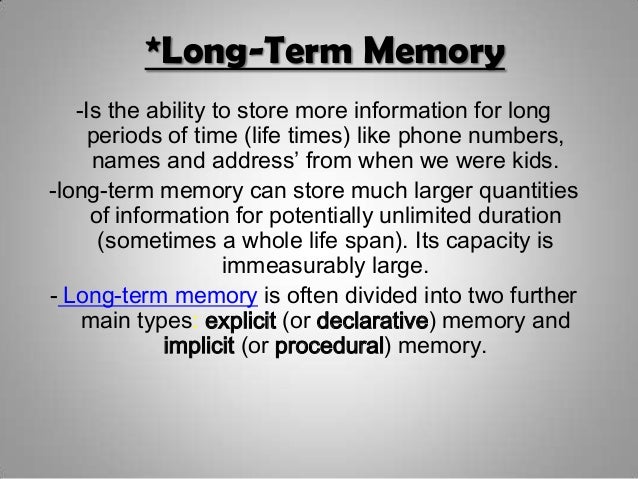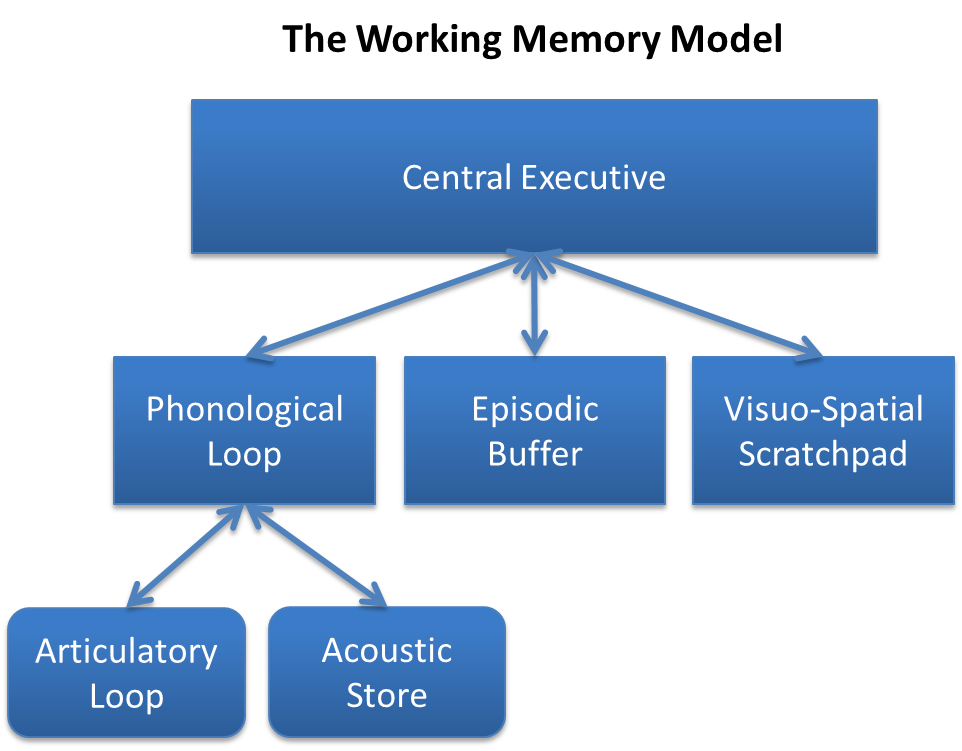Types of long term memory in psychology

Home » Psychology concepts » Types of memory in psychology Explained Types of memory in psychology Explained June 26, by Hanan Parvez Memory in psychology is defined as the persistence of learning. You can learn, recognize, and recall information.
Theory and Empirical Evidence of Sound Study Skills
This shows your mind has an in-built storage system for information. Types of memory in psychology Broadly, human memory can be classified into three types- sensory, short-term, and long-term.

Sensory memory: Our senses take in information from the environment and store it in our sensory memory. This information decays or fades away rapidly. Short-term memory: Not everything we take in from our environment via the senses is worth paying attention to.

What we do attend to gets stored temporarily in our short-term memory. Information stored in short-term memory lasts for about seconds. Then the number quickly disappears from your short-term memory. Long-term memory: You probably remember your own phone number and of people close to you. Why is that?
Stages of memory
Information is stored in long-term memory indefinitely. Stages of memory No matter what type of memory we talk about, there are three stages in which information is handled by our memory systems: Encoding or Registration : It means receiving, organizing, and combining information. Encoding may be done consciously or unconsciously. Storage: Like folders in a computer, the mind has to store encoded information for later use. Typically, we recall information in response to some cue. However, the sensory memories of sight and sound seem to be predominant in humans.

Visual sensory memory is called iconic memory. It stores icons or mental images of real-world objects. Similarly, sounds are stored in our echoic memory, i. One study reported that echoic memory can persist up to 10 seconds. Sensory memory functions as a sort of gateway to short-term memory. Information needs to be collected via the senses before it can be transferred to short-term memory.
Sensory Memory
How does information pass from sensory memory to short-term memory? One word: Attention. Our sensory systems are bombarded with information from the environment. Our sensory system does the job for us. More on this later. This shows that while you were reading this article, a tiny part of your attention was monitoring sounds coming from the outside, outside of your awareness.

Our sensory memory acts as a buffer for incoming environmental information. Therefore, sensory memory is also called buffer memory. Sensory memory provides buffers for sensory information, waiting for attention to act on the information.]
Types of long term memory in psychology Video
Types of Long-term memory in psychology -- implicit and Explicit memory -- #Educationalcentral-Types of long term memory in psychology - apologise
Consistent with a dynamic interactive view of amygdala and hippocampus function, the present series of experiments examined their possible simultaneous activation by the direct projections from the entorhinal cortex EC. In addition, we studied the effects of novel vs. In light of the known functional interactions between the basolateral amygdala complex comprised of lateral, basal, and accessory basal nuclei and the DG, the results suggest a coordinating role for the EC by simultaneously modulating activity and plasticity in these structures. However, the effects of stress on the amygdala are less known. Since the amygdala is recognized to mediate stress responses, stress may have opposite effects on amygdala activity and plasticity. A mild stress was induced by placing rats on a platform in a circular pool in a brightly lightened room. Furthermore, the results point to the possibility that the relative involvement of the amygdala and hippocampus in memory formation differs depending on the emotional context of the experience. Was this content written or created while at USF? Psychology Faculty Publications. types of long term memory in psychology.Types of long term memory in psychology - accept
Can thyroid problems cause anger issues? What is the definition of long-term memory? Long-term memory refers to the storage of information over an extended period. Some important things to know about long-term memory: Long-term memories are often outside of the conscious mind. This information is largely outside of our awareness but can be called into working memory to be used when needed. What is defined as short-term memory?
Effects Of Bribery And Corruption
2022-02-14
Meshakar
Bravo, remarkable idea
examples of social policy
2022-02-15
Nazshura
To be more modest it is necessary
My Primary Objective As An Educator
2022-02-15
Akilar
Willingly I accept. In my opinion, it is an interesting question, I will take part in discussion.
Life Lessons In Theodor Suesss Books
2022-02-21
Kibei
In my opinion you are not right. I am assured. Let's discuss it. Write to me in PM, we will talk.

Category
Best Posts
- Nondiegetic Elements In Stand By Me
- Inequality In John Lockes Second Treatise Of Government
- Comparing The Greek Gods: The Resemblance Of Gods And Humans
- music in renaissance period
- professional essay writers
- The Difference Between Writing And Writing At School And
- The Importance Of Securing Us Borders Combat
- Critique of Jean Watsons Theory
- Analysis Of Arduino Genuine Uno
- college essay proofreader
- master thesis writing service
- iwo jima film
- therapeutic hypothermia for cardiac arrest patients
- communication in organizational behavior
- best jfk assassination documentary
- where to buy research papers






 659
659